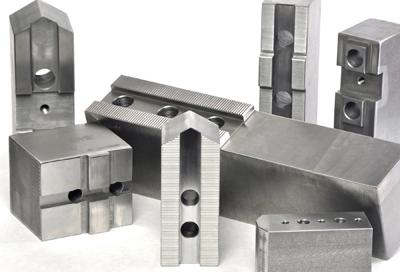
Soft blank top jaws from Dillon Manufacturing Inc. provide a smooth gripping surface, low T.I.R. (Total Indicator Reading), and have high holding power due to increased part contact. The smooth jaw surface leaves little or no markings on the finished surfaces. Available in 1018 steel, and 6061 aluminum, as well as 4140, 8620 and A2, brass, delrin, or stainless steel to suit virtually any CNC or manual chuck project involving turned or bored parts.
Dillon soft blank top jaws can be removed and later reused for the same operation, or machined to grip an altogether new part, until the blanks are consumed, making them ideal for machine shops which routinely handle parts with different shapes and geometries. The soft blank top jaws can be custom bored, turned, or shaped. A shoulder can be machine to provide a locating stop for parts to gain close tolerance repeatability for the parts length and depth.
They may be left soft or heat treated if the material is steel, depending upon project and quantities machined. Dillon soft blank top jaws are ideal for second operation finishing work such as shafts, gear blanks, wheel hub, and bearings.
Contact Details
Related Glossary Terms
- chuck
chuck
Workholding device that affixes to a mill, lathe or drill-press spindle. It holds a tool or workpiece by one end, allowing it to be rotated. May also be fitted to the machine table to hold a workpiece. Two or more adjustable jaws actually hold the tool or part. May be actuated manually, pneumatically, hydraulically or electrically. See collet.
- computer numerical control ( CNC)
computer numerical control ( CNC)
Microprocessor-based controller dedicated to a machine tool that permits the creation or modification of parts. Programmed numerical control activates the machine’s servos and spindle drives and controls the various machining operations. See DNC, direct numerical control; NC, numerical control.
- tolerance
tolerance
Minimum and maximum amount a workpiece dimension is allowed to vary from a set standard and still be acceptable.

